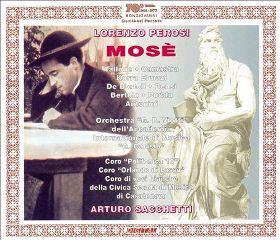Lorenzo Perosi – Mosé (1998)
Lorenzo Perosi – Mosé (1998)

1 - Prologo; Mosè tra i pastori Madianiti 36:58 2 - Parte Prima; Il roveto ardente 35:35 3 - Parte seconda; L'esodo 25:30 4 - Parte terza; Il passaggio del Mar Rosso 32:28 Cast: Raguele: Carlo Tallone, basso Sephora: Tatiana Korra Elmazi, soprano Mose: Marco Camastra, baritono La voce di Jehova: Carlo De Bortoli, basso Faraone: Sergio Bensi, baritono Aronne: Aldo Bertolo, tenore Il capofamiglia: Giovanni Maria Puddu, tenore Maria: Lorella Antonini, soprano Orchestra "G.B. Viotti" direttore Arturo Sacchetti (organ)
Monsignor Lorenzo Perosi (21 December 1872 – 12 October 1956) was an Italian composer of sacred music and the only member of the Giovane Scuola who did not write opera. In the late 1890s, while he was still only in his 20s, Perosi was an internationally celebrated composer of sacred music, especially large-scale oratorios. Nobel Prize winner Romain Rolland wrote: "It's not easy to give you an exact idea of how popular Lorenzo Perosi is in his native country." Perosi's fame was not restricted to Europe. A 19 March 1899 New York Times article entitled "The Genius of Don Perosi" began: "The great and ever-increasing success which has greeted the four new oratorios of Don Lorenzo Perosi has placed this young priest-composer on a pedestal of fame which can only be compared with that which has been accorded of late years to the idolized Pietro Mascagni by his fellow-countrymen." Gianandrea Gavazzeni made the same comparison: "The sudden clamors of applause, at the end of the [19th] century, were just like those a decade earlier for Mascagni."
In his day, Perosi was best known for his oratorios, large-scale works for chorus, soloists, and orchestra based on Latin texts. While the works can seem slow-paced today, at the time they were quite novel not only for their fusion of Renaissance polyphony, Gregorian chant, and lush, Verismo melodies and orchestrations, but also for Perosi's deep-seated faith in the words that he had set. The oratorio as a genre had been in decline in the preceding centuries, and Perosi's contributions to the canon brought him brief but significant international acclaim.
download: uploaded 4shared ziddu sugarsync mediafire anonfiles hostuje mixturecloud








